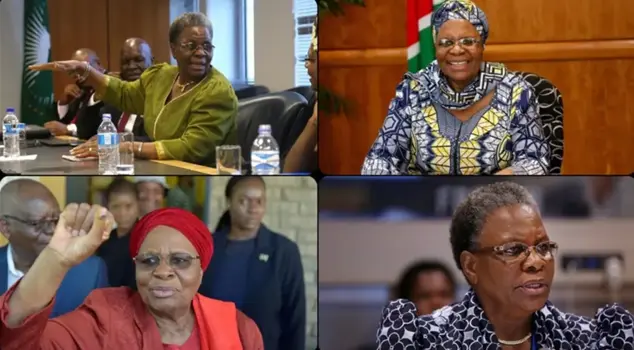
04.12.2024 13:50
Netumbo Nandi-Ndaitwah, who emerged as the winner of the general election held in Namibia on November 27, is the country's first female president and stands out as one of the most experienced and capable figures in Namibian politics. Having served in the cabinet for 24 consecutive years, Nandi-Ndaitwah prioritizes economic transformation and gender equality in the country.
As the candidate of the South West Africa People's Organization (SWAPO), which has been in power for approximately 34 years, Nandi-Ndaitwah's electoral success, receiving more than 57% of the votes, and her political career serve as an important example of the role of women in politics in Africa. Nandi-Ndaitwah's political career, which spans from the anti-apartheid independence movement to the presidency, is noteworthy.
FIGHTING FOR INDEPENDENCE FROM A YOUNG AGE
Nandi-Ndaitwah was born on October 29, 1952, in the Ovamboland town of South West Africa, under the management of the white racist apartheid regime of South Africa, as the 9th child in a family of 13. The daughter of a pastor, Nandi-Ndaitwah completed her primary education at a missionary school affiliated with the Anglican community in Namibia and actively participated in the independence struggle from a young age.
Due to her political activities, Nandi-Ndaitwah was exiled to Zambia in the mid-1970s, where she joined the ranks of the national independence movement SWAPO. Until Namibia gained independence in 1990, Nandi-Ndaitwah engaged in diplomatic activities in SWAPO's overseas offices.
ONE OF THE STRONGEST WOMEN FIGURES IN SWAPO
During this period, Nandi-Ndaitwah completed her postgraduate education in public administration and international relations in Scotland and England. Not only did she become one of the strongest female figures within SWAPO, but she also became a key player in the party's external relations. After being elected as a member of parliament in the first democratic elections held in the country in 1990, Nandi-Ndaitwah was elected president of Namibia's largest women's rights organization, the Namibia National Women's Organization (NANAWO), in 1991. She served as the Deputy Minister of International Relations and Cooperation in Namibia's first cabinet until 1996.
24 YEARS AS A CABINET MEMBER WITHOUT INTERRUPTION
Nandi-Ndaitwah began her ministerial career, which would last approximately 24 uninterrupted years, when she was appointed Minister of Gender Equality and Social Development in 2000. Notable for her achievements in this role, Nandi-Ndaitwah served as Minister of Information and Broadcasting from 2005 to 2010 and as Minister of Environment and Tourism from 2010 to 2012.
In 2012, Nandi-Ndaitwah was appointed Minister of International Relations and Cooperation by then-President Hifikepunye Pohamba, becoming one of the most important figures in the country's foreign policies for nearly 12 years. After the passing of President Hage Geingob in February, Nandi-Ndaitwah was appointed Vice President under the administration of Nangolo Mbumba and was selected as SWAPO's presidential candidate for the general elections on November 27.
ELECTION CAMPAIGN
In Namibia, which is among the countries with the highest income inequality in the world and struggles with unemployment rates reaching 20%, economic transformation and employment were among the most important agenda items in Nandi-Ndaitwah's election campaign. As SWAPO's first female presidential candidate, who has been in power for 34 years, Nandi-Ndaitwah frequently included issues such as gender equality and women's rights in her election promises. She also made the fight against corruption one of the main items of her election campaign.
ELECTORAL VICTORY
In the general elections held on November 27 in Namibia, Nandi-Ndaitwah outperformed her closest rival, the candidate of the Independent Patriots for Change (IPC) party, Panduleni Itula, by more than 30%. She received more than 57% of the votes and was elected as the country's first female president. Nandi-Ndaitwah's political career and electoral victory serve as an important source of inspiration and an example for women to take on leadership roles in all areas of society, especially in politics, both in the country and on the continent. Nandi-Ndaitwah, regarded as one of the most respected and successful political figures in the country, is expected to make significant contributions to Namibia's economic and social development.